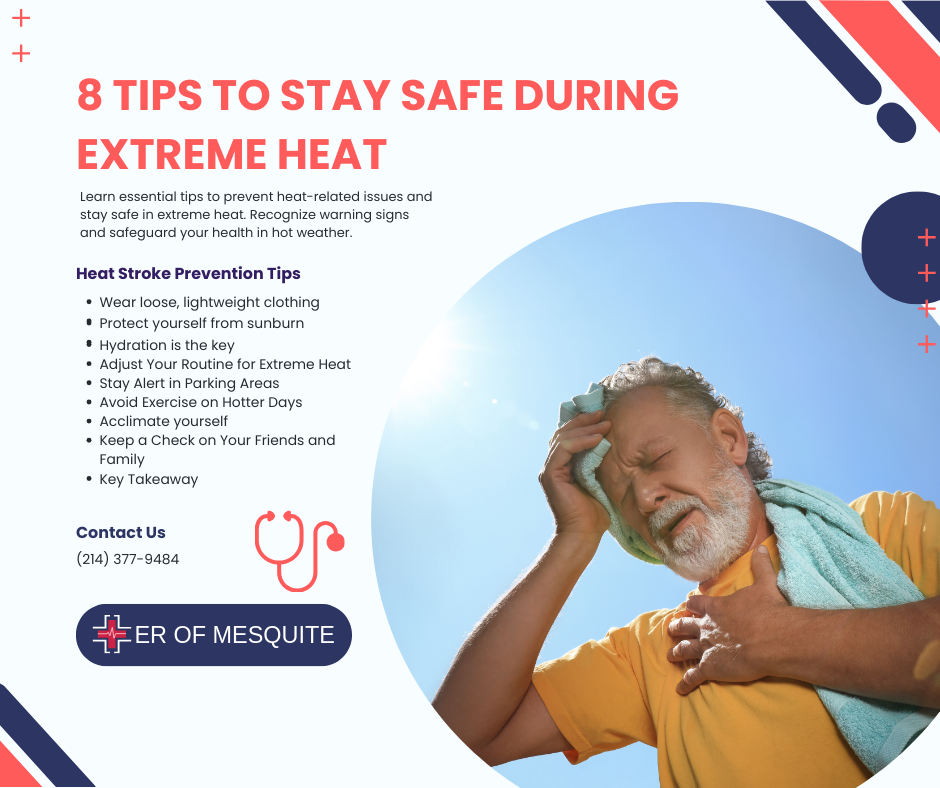Texas is known for its extreme heat. As summer approaches and climate change brings more triple-digit temperatures, prioritizing heat safety and learning effective tips to beat the heat are important. According to the Environmental Protection Agency, extreme heat poses a significant risk, causing more annual deaths than any other weather hazard.
Experts refer to heat as the silent killer because it causes more subtle damage than weather disasters like tornadoes or fires. While certain individuals, such as kids, seniors, homeless, and those with medical conditions, are more vulnerable, heat can affect anyone.
In this guide, we explore practical extreme heat safety tips to help you stay safe during periods of high temperatures. Prepare now to protect yourself and your loved ones from heatstroke and other heat-related risks with effective heatstroke prevention measures.
Heat Stroke Prevention Tips
Untreated heat stroke quickly harms your brain, heart, kidneys, and muscles. The longer treatment is delayed, the worse the damage gets, increasing the risk of severe complications or even death. Here are a few tips for heat safety to follow:
Wear loose, lightweight clothing
Tight or heavy clothing stops your body from cooling down properly. The best clothes for extreme heat let air circulate and wick away moisture from your skin.
Additionally, light-colored fabrics reflect more sunlight and heat compared to dark colors which absorb more heat. Opt for whites, pastels, and other light shades when dressing for hot weather.
Protect yourself from sunburn
Sunburn reduces your body’s ability to cool down. To guard against this, we recommend using a wide-brimmed hat, sunglasses, and applying broad-spectrum sunscreen with at least SPF 15 when outdoors as extreme heat precautions. Apply sunscreen liberally and reapply every two hours, or more frequently if swimming or sweating.
Hydration is the key
To stay safe in extreme heat, ensure you stay hydrated by drinking plenty of fluids, which helps regulate normal body temperature through sweating. In cases of severe dehydration, consider replenishing lost electrolytes with sports drinks or water containing salt tablets to maintain fluid balance.
Adjust Your Routine for Extreme Heat
During extreme heat, making informed choices can significantly impact your well-being. Avoid outdoor physical activities during the hottest parts of the day; check the local weather to plan accordingly. Visit cooling stations or malls if you lack air conditioning at home.
Stay Alert in Parking Areas
Heat safety awareness is crucial. Never leave anyone in a parked car, as this is a frequent cause of heat-related fatalities in children. The temperature inside a car parked in the sun can rise by 20 degrees Fahrenheit (more than 11 degrees Celsius) in just 10 minutes. It’s unsafe to leave someone in a parked car during warm or hot weather, regardless of cracked windows or shade. Always keep your parked car locked to prevent children from gaining access.
Avoid Exercise on Hotter Days
During extreme heat, take it easy during the hottest parts of the day. If you can’t avoid strenuous activity in hot weather, stay hydrated and rest frequently in a cool spot. Aim to schedule exercise or physical labor for cooler parts of the day, like early morning or evening.
Acclimate yourself
Limit the time spent working or exercising in heat until you acclimate to it. Those unaccustomed to hot weather, who are particularly susceptible to heat-related illness, should learn how to dress for heat. It takes several weeks for your body to adjust to higher temperatures.
Learn how to stay safe in extreme heat by avoiding hot environments and responding promptly to signs of overheating if you take medications or have a condition that increases your susceptibility to heat-related issues. Ensure medical assistance is accessible when engaging in vigorous sports or activities in hot weather to handle a heat emergency.
Keep a Check on Your Friends and Family
During times of exceptionally high temperatures, establish a system with a partner to regularly monitor the well-being of your friends and family, and ensure someone reciprocates for you. If you have elderly or health-compromised individuals in your circle, check on them twice daily during periods of extreme heat. Be vigilant for signs of heat exhaustion or heat stroke, as elevated temperatures can lead to serious health issues. Familiarize yourself with the symptoms of heat-related illnesses and be prepared to provide assistance as needed.
Key Takeaway
Understanding and following extreme heat safety tips is crucial to preventing heatstroke, a serious condition with potentially life-threatening consequences. Recognize signs like confusion, rapid heartbeat, and hot, dry skin, which indicate heatstroke. Stay hydrated, avoid prolonged exposure to high temperatures, and seek immediate medical attention if symptoms of heat-related illness occur.
If you or someone else shows signs of heatstroke, such as high temperature with hot, dry, red skin, we recommend visiting a nearby doctor. At the ER of Mesquite, we prompt, specialized care for heat stroke and other heat-related emergencies to prevent serious complications.
FAQs
How to stay safe in extreme heat?
To beat the heat, stay hydrated by drinking water regularly, limit outdoor activities during peak heat hours, and wear lightweight clothing and sunscreen to protect against sunburn and overheating.
How to protect yourself during heat waves?
Heat safety awareness is crucial during hot weather. Stay hydrated, seek shade or cool environments, wear appropriate clothing, and limit outdoor activities during peak heat to prevent heat-related illnesses. Keep an eye on vulnerable individuals, and be aware of symptoms like dizziness or nausea, which indicate potential heat exhaustion or heatstroke.
Is it safe to walk in extreme heat?
To stay safe in extreme heat, avoid walking too fast or too far. Adjust your speed, distance, and intensity based on how you feel. Take frequent breaks in the shade and rest if you begin to feel tired or unwell.
